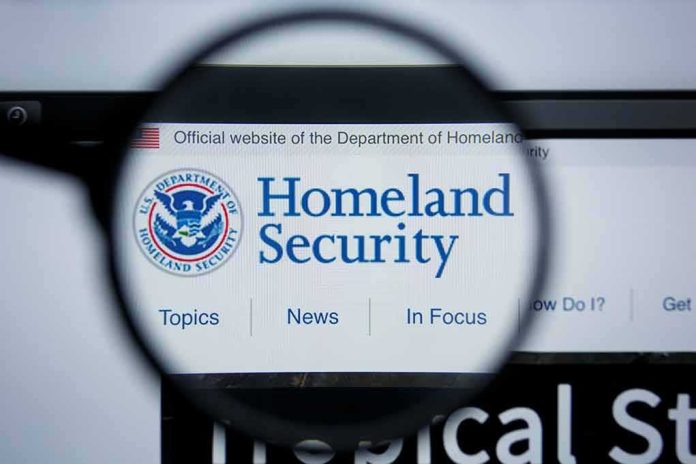
President Trump’s administration delivers on a campaign promise as 521,000 Haitians lose their temporary protected status in the United States, despite critics claiming the Caribbean nation remains too dangerous for repatriation.
Key Takeaways
- The Department of Homeland Security has terminated Temporary Protected Status (TPS) for over half a million Haitians, effective September 2, 2025.
- Haiti’s TPS designation, originally granted after the 2010 earthquake, expanded from covering 57,000 people in 2011 to over 520,000 by 2024.
- DHS Secretary Kristi Noem determined conditions in Haiti have improved sufficiently for safe return, despite ongoing gang violence controlling 80% of Port-au-Prince.
- The decision aligns with President Trump’s broader immigration reform agenda that emphasizes the “temporary” nature of protected status programs.
- Haitians affected by the decision are being encouraged to return home or pursue other legal immigration pathways if eligible.
DHS Announces Major Policy Reversal on Haiti
The Department of Homeland Security under President Trump has taken decisive action to address the long-standing issue of Temporary Protected Status for Haitian nationals. On June 27, DHS Secretary Kristi Noem announced that TPS for Haiti will expire on August 3, 2025, with full termination taking effect on September 2, 2025. This decision affects approximately 521,000 Haitians currently residing in the United States under TPS protection, a number that has grown dramatically from the 57,000 initially covered when the program began after Haiti’s devastating 2010 earthquake.
Secretary Noem’s announcement follows a comprehensive review of conditions in Haiti by various government agencies, including U.S. Citizenship and Immigration Services and the Department of State. The administration determined that the environmental situation in Haiti has improved enough that return is now feasible, despite ongoing security concerns that have prompted travel warnings from multiple countries.
Safety Concerns and Conflicting Assessments
The decision to terminate TPS for Haitians comes amid contradictory assessments about safety conditions in the Caribbean nation. While DHS has determined that Haiti is “safe for Haitian citizens to return home,” the U.S. embassy in Haiti simultaneously advises American citizens to “Depart Haiti as soon as possible” due to widespread violence. Security experts report that violent gangs control over 80% of Port-au-Prince, making even basic travel extremely dangerous. Both the U.S. State Department and UK Foreign Office continue to advise against travel to Haiti, citing rampant crime, civil unrest, and inadequate healthcare facilities.
“Depart Haiti as soon as possible,” said US embassy in Haiti
The situation on the ground in Haiti remains volatile following the 2021 assassination of President Jovenel Moïse. Everyday crimes such as robbery, carjackings, sexual assault, and kidnappings have become commonplace, particularly in urban areas. Despite these ongoing challenges, the Trump administration maintains that the conditions that originally warranted TPS designation have sufficiently improved to justify termination of the program, highlighting the intended temporary nature of the protection.
Trump Administration’s Broader Immigration Strategy
The termination of Haiti’s TPS designation represents a significant component of President Trump’s comprehensive immigration reform agenda. DHS officials emphasized that this decision “restores integrity in our immigration system and ensures that temporary protective status is actually temporary.” The action follows a February court order that partially vacated the previous TPS designation implemented under former DHS Secretary Alejandro Mayorkas, signaling a clear policy shift under the current administration.
“This decision restores integrity in our immigration system and ensures that temporary protective status is actually temporary,” said DHS spokesperson
The administration is actively encouraging Haitian nationals to make arrangements for departure, offering assistance through the CBP Home app. For those who may qualify, DHS has suggested pursuing other legal immigration pathways. This approach aligns with the recent Supreme Court decision that stayed a lower court order blocking the revocation of TPS for Venezuelans, indicating a broader trend in the administration’s approach to temporary immigration protections that had become effectively permanent under previous administrations.
Opposition and Community Impact
Predictably, the decision has drawn sharp criticism from Democrats and immigration advocates. Senator Elizabeth Warren has characterized the move as “shameful,” arguing that Haiti remains too dangerous for repatriation. Warren’s comments reflect the political divide on immigration policy, with conservatives supporting the President’s efforts to reform a system they believe has been abused, while progressives frame the decision as breaking promises to vulnerable communities.
“Donald Trump’s decision to rip away protections for Haitians who are legally in the United States is shameful. Haiti is not safe right now and Haitians with TPS are here legally after fleeing unfathomable violence and instability,” said U.S. Senator Elizabeth Warren (D-Mass.)
The termination has particular significance for communities like Springfield, Ohio, where significant numbers of Haitian immigrants have settled, creating both cultural enrichment and resource challenges for local infrastructure. As the September 2 deadline approaches, affected individuals and families face difficult decisions about their futures, while communities prepare for potential demographic shifts. The administration maintains that this decision, while difficult for some, ultimately strengthens America’s immigration system by ensuring that temporary programs function as originally intended.














